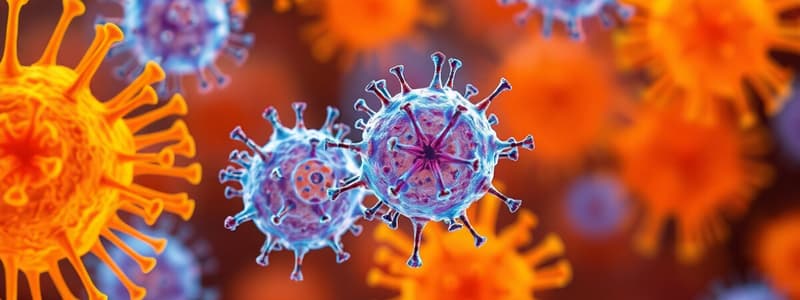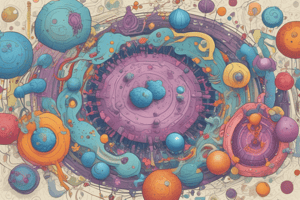Podcast
Questions and Answers
What is the primary role of immunological tolerance in relation to self-antigens?
What is the primary role of immunological tolerance in relation to self-antigens?
Which type of helper T cell is essential for the production of IgE antibodies?
Which type of helper T cell is essential for the production of IgE antibodies?
What distinguishes induced immunological tolerance from natural tolerance?
What distinguishes induced immunological tolerance from natural tolerance?
Which type of T cells are primarily responsible for cell-mediated immunity?
Which type of T cells are primarily responsible for cell-mediated immunity?
Signup and view all the answers
What is the role of Tfh (follicular helper T) cells?
What is the role of Tfh (follicular helper T) cells?
Signup and view all the answers
What could be a consequence of the immune system mistakenly responding to 'self' antigens?
What could be a consequence of the immune system mistakenly responding to 'self' antigens?
Signup and view all the answers
Why is tolerating T cells considered more crucial than tolerating B cells?
Why is tolerating T cells considered more crucial than tolerating B cells?
Signup and view all the answers
Which type of helper T cells is primarily involved in protecting surfaces against extracellular bacteria?
Which type of helper T cells is primarily involved in protecting surfaces against extracellular bacteria?
Signup and view all the answers
What is one of the reasons for ignorance in the immune response?
What is one of the reasons for ignorance in the immune response?
Signup and view all the answers
What happens during clonal deletion in the immune system?
What happens during clonal deletion in the immune system?
Signup and view all the answers
Which mechanism helps prevent auto-reactive T cells from responding to self-antigens?
Which mechanism helps prevent auto-reactive T cells from responding to self-antigens?
Signup and view all the answers
What role do anti-idiotype antibodies have in immune response?
What role do anti-idiotype antibodies have in immune response?
Signup and view all the answers
What is a consequence of receptor editing in B cells?
What is a consequence of receptor editing in B cells?
Signup and view all the answers
Which cytokines are primarily produced by regulatory T cells to suppress immune responses?
Which cytokines are primarily produced by regulatory T cells to suppress immune responses?
Signup and view all the answers
What can terminate experimentally induced tolerance?
What can terminate experimentally induced tolerance?
Signup and view all the answers
What is a distinguishing feature of regulatory T cells?
What is a distinguishing feature of regulatory T cells?
Signup and view all the answers
What is the primary function of central tolerance in the immune system?
What is the primary function of central tolerance in the immune system?
Signup and view all the answers
Which of the following cells undergoes maturation in the thymus?
Which of the following cells undergoes maturation in the thymus?
Signup and view all the answers
What happens to T cells that do not bind to MHC complexes during positive selection?
What happens to T cells that do not bind to MHC complexes during positive selection?
Signup and view all the answers
What mechanism is NOT associated with central tolerance?
What mechanism is NOT associated with central tolerance?
Signup and view all the answers
What is clonal deletion in the context of B cell tolerance?
What is clonal deletion in the context of B cell tolerance?
Signup and view all the answers
Which process allows B cells that bind to self peptides to develop a new receptor?
Which process allows B cells that bind to self peptides to develop a new receptor?
Signup and view all the answers
During which selection process are T cells tested for their affinity to self antigens?
During which selection process are T cells tested for their affinity to self antigens?
Signup and view all the answers
What role do transcriptional regulators AIRE and Fezf2 play in T cell tolerance?
What role do transcriptional regulators AIRE and Fezf2 play in T cell tolerance?
Signup and view all the answers
How does peripheral tolerance function as a secondary mechanism?
How does peripheral tolerance function as a secondary mechanism?
Signup and view all the answers
Which term describes an antigen that induces a state of tolerance?
Which term describes an antigen that induces a state of tolerance?
Signup and view all the answers
Compared to B cell tolerance, how is T cell tolerance characterized?
Compared to B cell tolerance, how is T cell tolerance characterized?
Signup and view all the answers
What can cause the breakdown of tolerance in the immune system?
What can cause the breakdown of tolerance in the immune system?
Signup and view all the answers
What characterizes the concept of 'ignorance' in immunological tolerance?
What characterizes the concept of 'ignorance' in immunological tolerance?
Signup and view all the answers
Study Notes
Immunological Tolerance
- Immunological tolerance is the failure to mount an immune response to an antigen.
- It can be natural (self-tolerance) or induced.
- Natural tolerance prevents the immune system from attacking the body's own proteins—failure to do so results in autoimmune diseases.
- Induced tolerance is directed against external antigens. Examples include:
- Preventing allergic reactions (e.g., to peanuts, insect stings, pollen).
- Enabling transplanted organs to survive.
- Preventing inflammation against harmless/beneficial gut bacteria.
- Tolerance is an active, specific response to an epitope (antigen part), similar to an immune response.
- B cells and T cells can be tolerant, but T cell tolerance is more critical because B cells need T cell help to make antibodies.
Types of Helper T Cells
- Th1: Participate in both cell-mediated and antibody-mediated immunity. Crucial for controlling intracellular pathogens (e.g., viruses, TB bacteria). Assists cytotoxic T cells (potent weapons against intracellular pathogens) via cytokines.
- Th2: Crucial for B cell help and IgE antibody production; also assists in some IgG production. Needed to control extracellular pathogens.
- Tfh (Follicular Helper T cells): Provide help to B cells to become antibody-secreting plasma cells in lymphoid follicles. The most abundant helper T cells; specialized in B cell support.
- Th17: Protect surfaces (e.g., skin, gut) from extracellular bacteria.
Central Tolerance
- Also known as negative selection.
- Eliminates developing T and B lymphocytes that react to self-antigens.
- Ensures immune system does not attack the body's own peptides.
- Occurs in primary lymphoid organs (thymus and bone marrow).
- B cell maturation in bone marrow and T cell in thymus.
B Cell Tolerance
- Immature B cells in bone marrow undergo negative selection if they bind to self-peptides.
- Proper functioning BCRs recognize non-self antigens/pathogen-associated molecular patterns.
- Outcomes of BCR auto-reactivity include:
- Apoptosis (clonal deletion)
- Receptor editing (change to a non-self-reactive BCR)
- Induction of anergy (non-reactivity)
T Cell Tolerance
- Occurs in the thymus.
- Involves both positive and negative selection.
- T cell receptors must recognize self MHC molecules with bound non-self peptides.
Steps of T Cell Tolerance
- Positive selection: T cells tested for ability to bind peptide-MHC complexes with affinity. Cells incapable of binding MHC I or II die. Selected cells survive and are either CD8+ (MHC I) or CD4+ (MHC II). Positive selection occurs in the thymic cortex.
- Negative selection: T cells tested for affinity to self-peptides; if they bind, they undergo apoptosis. Thymic epithelial cells display self-antigens. Negative selection occurs in the cortico-medullary junction and thymic medulla.
- Selected T cells (not self-reactive) migrate to secondary lymphoid organs as mature naïve T cells.
Peripheral Tolerance
- A backup mechanism to control auto-reactivity of cells escaping central tolerance.
- Occurs after cells leave primary lymphoid organs.
- Mechanisms include: T-cell anergy, regulatory T cells, and clonal deletion
- Mechanisms include clonal deletion, clonal anergy, and peripheral suppression by T cells.
Tolerance cont....
- Tolerogen: antigen that induces tolerance.
- Tolerance to tissues and cells can be experimentally induced by injecting hemopoietic stem cells or grafting bone marrow/thymus during early life. Chimeras are produced.
- Tolerance to soluble antigens can be experimentally induced.
- Induction of tolerance to T cells is easier than B cells.
- Antigen persistence is required to maintain tolerance.
- Tolerance can be broken naturally or artificially.
Ignorance
- Passive form of immunological tolerance.
- Auto-reactive T and B cells may exist but are unaware of their auto-antigens due to low antigen concentration or sequestration in privileged sites.
- Failure to trigger a response because receptors aren't sufficiently occupied by the antigen.
Mechanisms of Tolerance Induction
- Anti-idiotypic antibodies: Experimentally produced antibodies that can inhibit immune responses to specific antigens.
- Suppressor cells (Regulatory T cells): CD4+ T lymphocytes expressing high levels of CD25.
- Generated through self-antigen recognition in thymus or periphery. Produce TGF-β and IL-10 to suppress immune responses.
Studying That Suits You
Use AI to generate personalized quizzes and flashcards to suit your learning preferences.
Description
Explore the concept of immunological tolerance, including its natural and induced forms, and the crucial role of T cells in immune responses. This quiz covers the mechanisms that prevent the immune system from attacking self-antigens and the importance of tolerance in preventing autoimmune diseases and enabling organ transplants.




